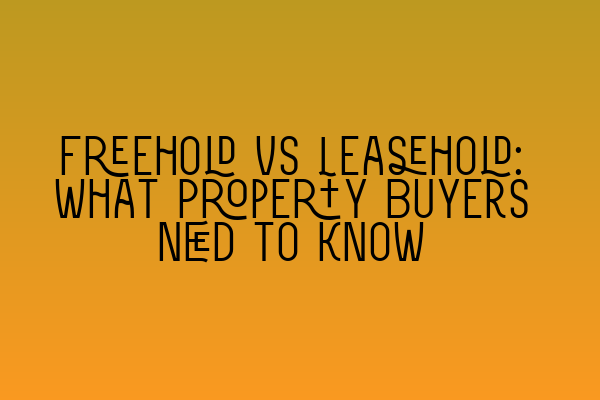Freehold vs Leasehold: What Property Buyers Need to Know
When you’re looking to buy a property, one of the key decisions you’ll need to make is whether to opt for a freehold or leasehold property. This decision can have significant implications for your ownership rights and responsibilities, so it’s important to understand the differences between the two. In this blog post, we’ll explore the distinctions between freehold and leasehold properties and highlight what property buyers need to know.
Freehold Property
Let’s start by discussing freehold properties. When you buy a freehold property, you become the outright owner of both the property and the land it sits on. This means you have complete control and ownership rights over the property for an indefinite period. As the freeholder, you’re responsible for the maintenance and repair of the property.
One of the key advantages of owning a freehold property is that you have more freedom to make alterations and improvements without seeking permission from a landlord or management company. This can be particularly beneficial if you’re planning to extend or modify the property to suit your needs.
Another advantage is that freehold properties tend to appreciate in value over time, making them a desirable long-term investment option. However, it’s worth noting that freehold properties are generally more expensive to purchase upfront compared to leasehold properties.
Leasehold Property
Now, let’s explore leasehold properties. With a leasehold property, you own the right to occupy the property for a fixed period of time, typically referred to as the lease term. During this term, you’ll pay a ground rent to the freeholder, who retains ownership of the land on which the property is located.
Leasehold properties are typically found in apartment buildings or developments, where the land and common areas are jointly owned by the freeholder or a management company. As a leaseholder, you’ll have certain obligations, such as paying service charges for the maintenance and upkeep of shared spaces.
The lease term for a leasehold property can vary, but it’s crucial to understand the remaining length of the lease before buying. As the lease term decreases, the property’s value may decrease as well, making it potentially more challenging to sell or secure a mortgage in the future. Therefore, it’s essential to consider the remaining term and potential for lease extensions before making a purchase.
Understanding the Distinctions
Now that we’ve covered the basics of freehold and leasehold properties, it’s important to understand the implications of these distinctions.
For property buyers, the decision often comes down to personal preferences and circumstances. If you value complete ownership and control over your property without lease restrictions or ongoing ground rent fees, a freehold property may be the preferable option. However, bear in mind that freehold properties can be more expensive upfront.
On the other hand, if you’re looking for a more affordable entry into the property market or prefer the convenience of communal areas being taken care of by a management company, a leasehold property could be a suitable choice. Just ensure you carefully review the terms of the lease, remaining years, ground rent, and service charges.
Seek Professional Advice
When considering a property purchase, it’s always wise to seek advice from an experienced property law solicitor. They can guide you through the legal complexities and ensure you fully understand your rights and obligations, regardless of whether you opt for a freehold or leasehold property.
At SQE Property Law & Land Law, our team of experts is well-versed in the intricacies of both freehold and leasehold properties. We provide professional legal advice and assistance to property buyers, helping them navigate the complexities of property transactions.
If you’re preparing for the SQE exams and looking for additional resources, we offer SQE 1 Practice Exam Questions and SQE 1 Practice Mocks FLK1 FLK2. Our SQE 1 and SQE 2 Preparation Courses are designed to help you succeed in these rigorous exams. Stay up to date with the latest SRA SQE Exam Dates by visiting our website.
In conclusion, understanding the distinctions between freehold and leasehold properties is crucial for property buyers. Each option has its advantages and considerations, so it’s important to assess your individual needs and seek professional advice before making a decision. Ultimately, with the right guidance and knowledge, you can secure a property that aligns with your goals and aspirations.
Disclaimer: This blog post is not legal advice and should not be construed as such. Always consult with a qualified solicitor for personalized advice about your specific situation.
